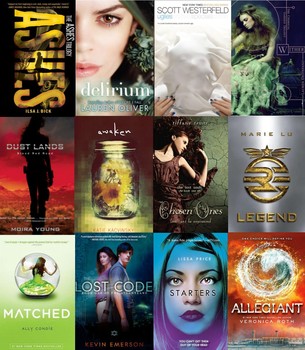YA Novels: Y all the Same?
Too much of a good thing is bad.

June 13, 2016
How many people do you know that really love reading? It’s okay to include yourself. If you’re going to high school like me, chances are the number isn’t too high. But why is that? Are teens just lazy? Or is it because the staggering majority of books aimed at them are a breeding ground for trite, overused themes and topics that publishers seem to think resonate with the hip youth. However, people seem to forget that it not only makes less people read, but that it is also harmful to the art of writing in general.
So what exactly do I mean by “themes and topics” you may ask? According to the Merriam-Webster dictionary, a theme is “the main subject that is being discussed or described in a piece of writing, or a movie.” In context, it is usually used for things that aren’t literal. For example, the theme of Romeo and Juliet is not a boy falling for a girl and them messing up stuff for their families before killing themselves and making everything better. That would be the topic, albeit a rather poor wording of it. The theme can be described as the destructive power of lust (Or love, depending on who you ask). The topic, of course, is just the subject matter of the book.
A few common themes in modern YA literature are society being corrupt and/or unaccepting of difference, difference being good, and valuing freedom above security. Many feature “Strong, independent” women with little to no personality (Or an unlikeable one) due to fear of somehow being “sexist”, or as I call them, SIWs. This problem can spread to male characters as well, with their only personality trait being “brave.” These tropes can be seen in many modern books, such as The Hunger Games, The Maze Runner, Divergent (Made pretty obvious by the title), and many more lesser known stories. Themes, however, can be easily masked. Did you know that the Pixar movie The Incredibles is really just a midlife crisis story? Or that Deadpool is a fairly traditional revenge plot? Well, if you pay attention to things such as themes, even unconsciously, you can probably tell. But what makes these movies fresh, different, and beloved is the fact that they is delivered in an original style as a story about a family of Superheroes or… whatever we can categorize Deadpool as. YA novels, however, generally do a poorer job masking their most commonly used themes and stories.
Upon looking at the top 10 best selling YA books on Amazon, this becomes very apparent. The entire top six are six books from the same series: A Shade of Vampire. Numbers 7, 9, and 10 are the Hunger Games trilogy, which are (in)famous for popularizing the Dystopian genre to mainstream audiences. It actually did give us a few well-written, interesting characters though. But it also gave us Katniss. And Peeta. When looking at the list of the best twenty or so YA novels of 2015 according to Barnes and Noble, you will find about a quarter of them preaching corruption in realistic modern day or not so distant future settings. The themes are very poorly masked due to very similar topics. Almost all of them are about teenagers and for teenagers or take place in a dystopian future. There is little to no variety.
But why is this such a bad thing? If so many people enjoy it so much, what can be wrong with it? Actually, a lot. The obvious issue is oversaturation. Too much of a good thing is bad. Too much of something that frequently turns out bad is horrendous. With so much of the same thinly masked themes and topics being worn down, so much of the YA industry has become a slog through countless iterations of the same basic ideas. The second problem is much more menacing, but also much less clear to many people. With these themes being drilled into literature so much, what will become of the stories of the next generation?
With such anti-society messages that portray rebels as the only righteous people, youthful rebellion is likely to turn into woeful cynicism when the people who grew up with such messages take over the industry lacking their youthful energy. What will happen to stories that just embrace the best of us like Lord of the Rings or Star Wars? There will certainly be writers out there that still want to tell stories like this, but a generation of literature characterized by a slog of gloomy, cynical tales is surely one that won’t be remembered fondly.
To close things off, I’d like to say that the YA industry is not doomed. Harry Potter remains popular and it’s pretty removed from most of the problems above. Even now, there are a few diamonds in the rough like Escape From Furnace by Alexander Gordon Smith that avoid quite a few of the tired cliches of the latest generation. It all comes down to what the authors write and the customers buy. And you, the customer, have to make the decision that you feel is right for your own enjoyment or perhaps even the greater picture of writing as an art form.

